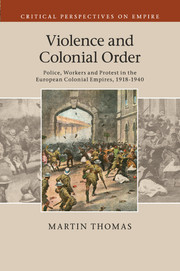Crossref Citations
This Book has been
cited by the following publications. This list is generated based on data provided by Crossref.
2014.
Wine, Sugar, and the Making of Modern France.
p.
187.
2014.
Wine, Sugar, and the Making of Modern France.
p.
225.
2015.
A World History of Rubber.
p.
142.
Jerónimo, Miguel Bandeira
and
Pinto, António Costa
2015.
The Ends of European Colonial Empires.
p.
1.
2015.
A Nervous State.
p.
309.
Ortiz, David G.
2015.
Handbook of Social Movements across Latin America.
p.
43.
CONDOS, MARK
2016.
Licence to Kill: The Murderous Outrages Act and the rule of law in colonial India, 1867–1925.
Modern Asian Studies,
Vol. 50,
Issue. 2,
p.
479.
Lauro, Amandine
2016.
Policing New Risks in Modern European History.
p.
57.
Taha, Mai
2016.
Reading ‘Class’ in International Law.
Social & Legal Studies,
Vol. 25,
Issue. 5,
p.
567.
Mawby, Spencer
2016.
Workers in the Vanguard: the 1960 industrial relations ordinance and the struggle for independence in Aden.
Labor History,
Vol. 57,
Issue. 1,
p.
35.
Morelle, Marie
and
Le Marcis, Frédéric
2016.
Pour une pensée pluridisciplinaire de la prison en Afrique.
Afrique contemporaine,
Vol. n° 253,
Issue. 1,
p.
117.
Thomas, Martin
2016.
The Encyclopedia of Empire.
p.
1.
Eick, Volker
2017.
»Gute Ordnung«?.
Freie Assoziation,
Vol. 20,
Issue. 1,
p.
123.
Blanchard, Emmanuel
2017.
Recours à la force et demandes de justice en situation (post-)coloniale.
Crime, Histoire & Sociétés,
p.
87.
Silvestri, Michael
2017.
‘A Fanatical Reverence for Gandhi’: Nationalism and Police Militancy in Bengal during the Non-cooperation Movement.
The Journal of Imperial and Commonwealth History,
Vol. 45,
Issue. 6,
p.
969.
Edwards, Zophia
2017.
Rethinking the Colonial State.
Vol. 33,
Issue. ,
p.
175.
Hynd, Stacey
2017.
Future Directions in African Crime and Criminal Justice History.
Crime, Histoire & Sociétés,
p.
205.
Edwards, Zophia
2018.
No Colonial Working Class, No Post-Colonial Development: a Comparative-Historical Analysis of Two Oil-Rich Countries.
Studies in Comparative International Development,
Vol. 53,
Issue. 4,
p.
477.
Edwards, Zophia
2018.
Labor, Agency, and State‐building in Trinidad and Tobago: Toward a Postcolonial Sociological Approach to Development.
Journal of Historical Sociology,
Vol. 31,
Issue. 2,
p.
134.
2018.
European Overseas Empire, 1879–1999.
p.
109.



